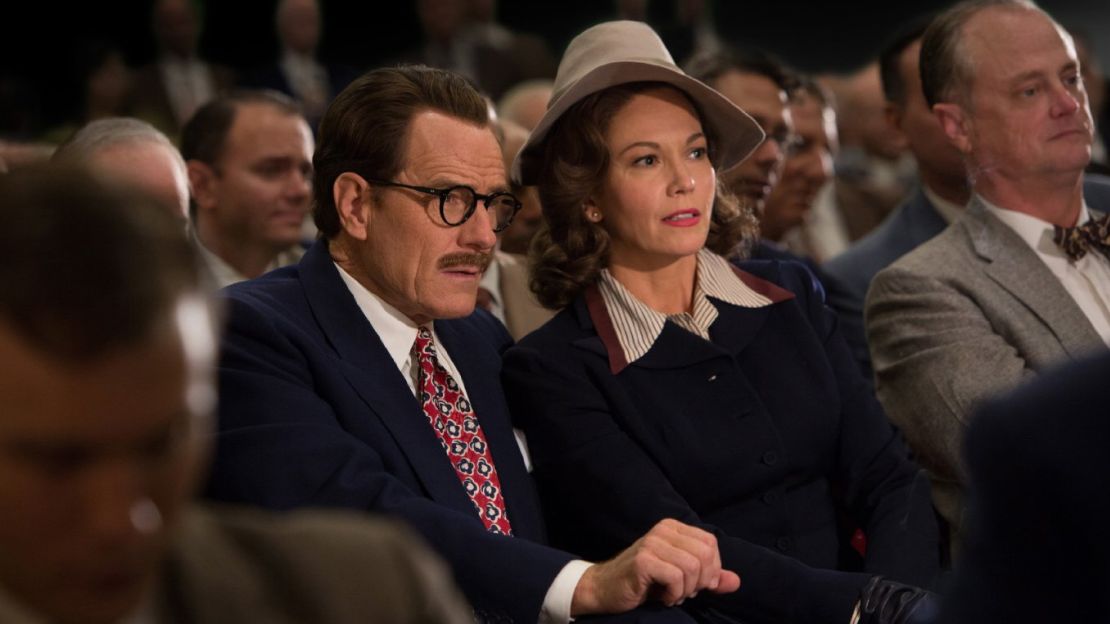Editor’s Note: Charles Kaiser is the author of “The Cost of Courage,” “1968 In America” and “The Gay Metropolis.” The opinions expressed in this commentary are his.
Story highlights
Charles Kaiser: The new movie "Trumbo" starring Bryan Cranston expertly portrays the 1950s
Kaiser: The climate of fear was an important theme of that decade, which is often wrongly depicted as a period of innocence
He says his parents' secret engendered fear in his family
“Trumbo,” the new feature film about the blacklisted screenwriter Dalton Trumbo and the rest of the “Hollywood Ten,” is the must-see holiday movie for anyone too young to remember what the 1950s were really like in America.
That group includes its talented director, Jay Roach, but he still does a great job of recreating the era. Roach’s film manages to be fine entertainment, an important history lesson, and a mirror for the present, all at once.

Conservatives often invoke the 1950s as a golden period of peace and prosperity in American life.
They were a great time for millions of straight white men who returned from World War II to benefit from unprecedented economic opportunity, a new interstate highway system, and the most beautiful automobiles Detroit has ever produced. But if you were a woman, an African-American, a gay person – or anyone who had ever had the briefest flirtation with the Communist Party – you experienced a very different America, with many significant roadblocks.
Blacks and whites were still strictly segregated, gay people were banned from employment by the federal government and all of its contractors, a woman’s place was in the home (and without a credit card), and ex-communists were unwelcome everywhere: in Hollywood, the State Department and public high schools across the country.
A widespread fear
Fear was the dominant leitmotiv of the decade. My personal memories of how my parents were touched by that fear deepened the impact of the movie.
Trumbo focuses on the “radicals” who the House Un-American Activities Committee decided were unfit to influence American film audiences by writing Hollywood films. It was the committee that humiliated Trumbo and the others by demanding, “Are you now, or have you ever been a member of the Communist Party?” but as Trumbo pointed out, it was the studio chiefs who gave the investigators all of their power, by denying employment to anyone who refused to cooperate after 1950.
In the 1970s this kind of serious history was still one of Hollywood’s staples, but now we’re lucky to get a couple of movies a year as good as this one. (“Spotlight,” the story of the Boston Globe investigation of pedophile priests in the Catholic Church, is another one this fall.)

Trumbo benefits from powerhouse performances from Bryan Cranston, who plays the screenwriter, and Diane Lane, who is terrific as his steady, devoted wife. Louis CK plays another blacklisted writer, and Helen Mirren lights up the screen as a vicious Hedda Hopper, who was the blacklist’s biggest cheerleader in print and on television.
Trumbo had to endure a year in a federal penitentiary after he was convicted of contempt of Congress and the Supreme Court refused to overturn the verdict. After that, he barely managed to feed and house his family by writing dozens of screenplays under phony names, including a large number for the King brothers (one of whom is brilliantly portrayed by John Goodman), the ex-pinball machine salesmen who made downmarket movies like “The Syndicate,” but also produced “The Brave One,” a bullfighter film that won Trumbo an Oscar – but only under the fake name of Robert Rich.
The mirror here for the present: The money wasted by Congress on these poisonous investigations is not unlike the endless expenditures of current legislators on Benghazi investigations. The movie reminds us that congressional malfeasance isn’t an aberration; it’s an unfortunate American tradition. It was only after 1960 – when Otto Preminger put Trumbo’s name on “Exodus,” Kirk Douglas put Trumbo’s name on “Spartacus,” and John F. Kennedy crossed an American Legion picket line to watch “Spartacus” – that the blacklist finally lost its power to keep Trumbo’s work anonymous.
The family secret
A big reason the movie affected me so deeply was the opinion of McCarthyism I inherited from my parents.
The chief red-baiters of the 1950’s were Republican Sen. Joseph McCarthy from Wisconsin and his henchman, Roy Cohn, and I was brought up to believe that these were two of the most evil men who ever lived, because of the many lives they destroyed for no good reason.
At the University of Wisconsin in the 1930s, and then at Balliol College at Oxford, where he was a Rhodes scholar, my father was a liberal anti-communist. Unlike so many of his friends, he never joined the Communist Party, so he was never directly affected by McCarthyism. But nothing appalled him more than the fate of his contemporaries who had.
He held four federal jobs under three Democratic presidents that required confirmation by the Senate. And despite his lifelong opposition to communism, there was a shiver inside the family every time he was confirmed.
The worry was that the FBI might uncover the dangerous fact that when my mother lived in London for a year in 1938-39, while my father was courting her from Oxford, she worked for Spanish Relief – an organization that sent food and clothing to the anti-fascist side in Spain.
The climate of fear was so intense, my father believed that the revelation of my mother’s charitable work could have been enough to prevent his confirmation. But nobody ever unearthed it.
Hollywood’s surrender
The other person who drilled into me the horror of this period was Arthur Laurents, the playwright who wrote the books for “West Side Story” and “Gypsy” and later in his career wrote several plays about the blacklist, including “Jolson Sings Again.”
When Laurents first arrived in Hollywood after the war, he found it “wildly exciting intellectually: there were really bright people and all the cream of the European refugees, like Thomas Mann.” But after the blacklisting period, most of those people left the movie business for good. “The blacklist destroyed Hollywood,” he said.
Laurents had a special contempt for anyone who had “named names” in this period – identifying former members of the Communist Party for Congress. When the choreographer Jerome Robbins did that, Laurents said the reason was “very simple. It was the same thing as with Elia Kazan. They wanted movie careers. That was it. He wanted to do ‘The King and I,’ and he did. Jerry said, `It won’t be for years until I know whether I did the right thing.’ And I said, `Oh, I can tell you now. You were a s**t.’ But I wasn’t so pristine myself. I worked with him afterwards and I knew he’d been an informer.”
The movie “Trumbo” doesn’t pretend to be objective about all of this: It clearly takes the side of those whose careers were mauled by the congressional investigators. But it also takes pains to emphasize the moral ambiguity of this period that Laurents hinted at, by quoting a speech Trumbo made in 1970:
“There was bad faith and good, honesty and dishonesty, courage and cowardice, selflessness and opportunism, wisdom and stupidity, good and bad on both sides; and almost every individual involved, no matter where he stood, combined some or all of these antithetical qualities in his own person, in his own acts.”
In the end, it is the movie’s refusal to paint this period in black and white which is one of its most important virtues.
Join us on Facebook.com/CNNOpinion.
Read CNNOpinion’s new Flipboard magazine.
